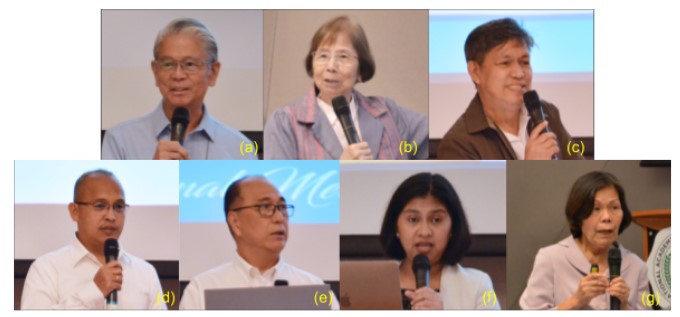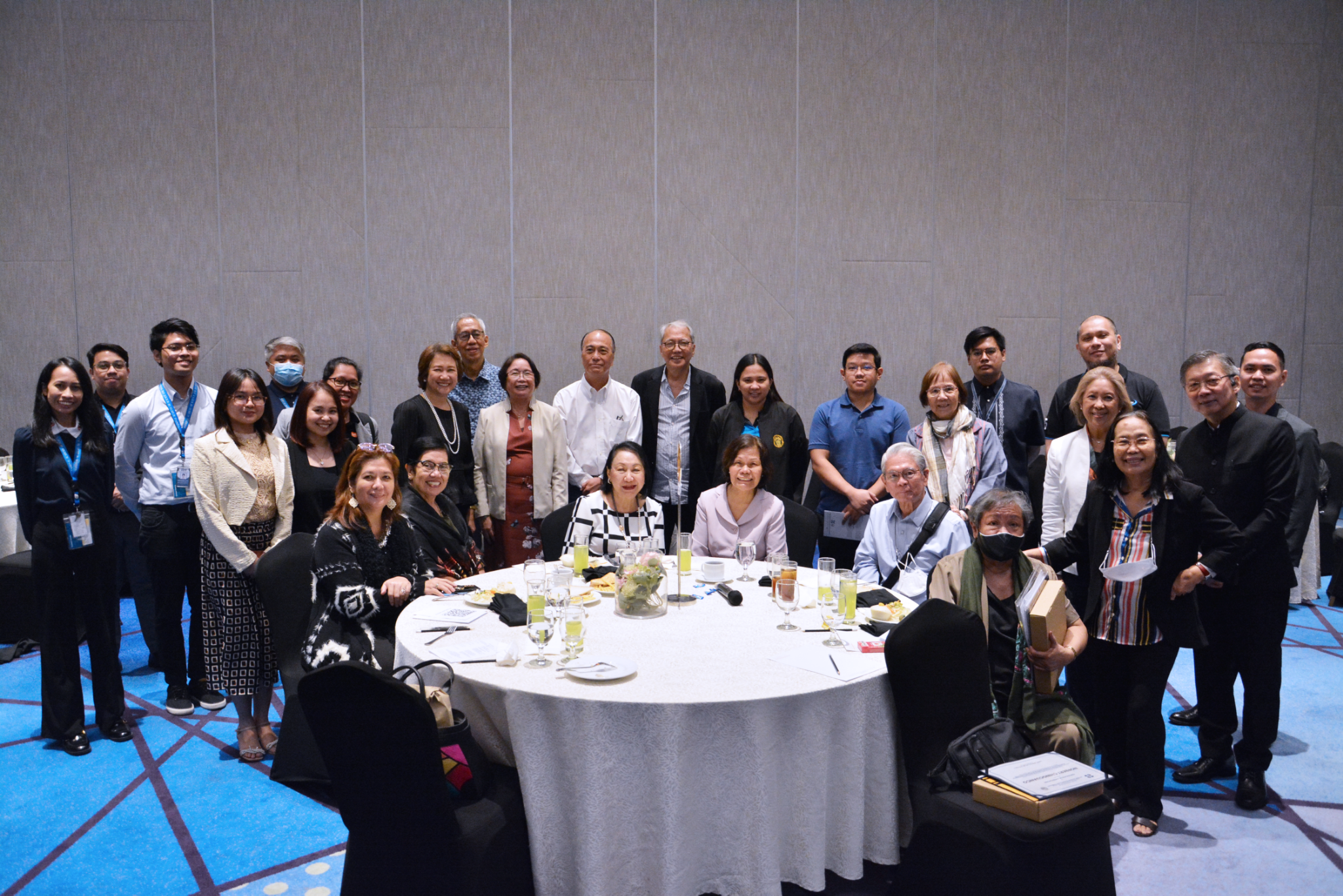Quezon City—The National Academy of Science and Technology, Philippines (NAST PHL) conducted the Science Policy Forum on Factors Affecting Export Trade in the Philippines: Product Standards, Accreditation, Metrology and Regulatory Laboratories on 14 November 2023 at the Luxent Hotel, Quezon City.
The Philippines, as a maritime archipelago, faces distinct challenges and opportunities. While leveraging these resources could boost our exports, our growth has lagged behind ASEAN neighbors, showing a mere 4% increase in the past two decades. With a projected population of 140 million by 2045, supporting this populace becomes critical. Thus, to strengthen the Philippine export sector globally, the government has adopted an “integrated whole-of-government commitment to deliver broad access to National Quality Infrastructure (NQI)” as the foundation of the strategic framework to promote trade and investments.
NQI is a comprehensive system encompassing public and private institutions, legal frameworks, and standards. It includes facets like standardization, accreditation, metrology, testing, and market surveillance, all aimed at enhancing our global market participation.
Academician William G. Padolina, Chair of the Special Concerns Steering Committee of NAST PHL, centered his message on the imminent demographic shift in the Philippines, projected to grow from 109 million to 142 million by 2045, according to the Philippine Statistics Authority (PSA). Acd. Padolina introduced PAGTANAW 2050, a comprehensive proposal aimed at addressing critical issues arising from this population surge. He highlighted key drivers such as geopolitical and geoeconomic shifts, technological advancements, systemic competition, and transnational challenges, underscoring the necessity of readiness for unforeseen disruptions, often termed “black swans.” This forward-looking approach aims to navigate future uncertainties for sustainable growth and development.
At present, the core bodies under the NQI, such as the National Metrology Laboratory (NML), Philippine Accreditation Bureau (PAB), and Bureau of Philippine Standards (BPS), exist as discussed by Academician Evelyn Mae Tecson-Mendoza. However, the not-so-clear mandates and roles within the NQI lead to confusion among stakeholders. To address this, timely dissemination of information, reduction of bureaucratic paperwork, and change in regulatory focus toward development are essential.
PAB, situated under the Department of Trade and Industry's Competitiveness and Innovation Group, functions as the central authority responsible for accrediting inspection, testing, and certifying bodies, along with other entities like Management System Certification Bodies, Product Certification Bodies, Person Certification Bodies, Validation/Verification Bodies, Testing and Calibration Labs, Medical Testing Labs, Inspection Bodies, and Proficiency Testing Providers, according to PAB Assistant Director Ernani M. Dionisio.
BPS Director, Neil P. Catajay, discussed that as the national standards body, BPS is responsible for setting voluntary and mandatory standards, technical regulations, and test methods to support the objectives of the NQI. It is also involved in the reliable application of quality standards, certification, and accreditation, thereby contributing to the protection of health and safety, the efficient use of resources, and the enhancement of consumer welfare.
In the context of the NQI, Ms. Mary Grace R. Mandigma shared the collaboration between the Bureau of Philippine Standards (BPS) and the Bureau of Agriculture and Fisheries Standards (BAFS) which has played a pivotal role to enhance the Philippines' ability to actively participate in the global market, with its regulatory framework serving as the heart of the quality governance structure. The goal of the NQI is for the various players to comply with the set standards, where testing procedures are conducted by accredited agencies and measurements adhered to are standardized parameters. This quality framework, guided by principles and structure, aims to ensure that products meet the required standards for global competitiveness.
Engr. Manuel M. Ruiz discussed the role of the National Metrology Laboratory (NML) which has emerged as a critical force impacting various sectors through its expertise in the science of measurement, or metrology. Metrology is defined as the field of knowledge concerned with measurements, administration, control, and regulation of measurements and proper use. The NML has upgraded itself to meet global standards and has contributed significantly to the broader goals of the NQI, extending beyond quality to encompass consumer protection and environmental sustainability.
Engr. Cirila S. Botor, the President of the Philippine Metrology, Standards, Testing and Quality Inc. (PhilMSTQ) presented the pivotal role of the private sector in strengthening the NQI by patronizing accredited services, adhering to standards, and seeking the expertise of accredited institutions in various domains like calibration labs, testing labs, inspection bodies, and certification bodies.

The event featured insightful presentations from three experts, each shedding light on different facets of export trade. Firstly, Dr. Aida R. Aguinaldo, former deputy director of the Food and Nutrition Research Institute (FNRI) briefly discussed the NQI development in the Philippines. To strengthen the national quality infrastructure in the country, she discussed several policy recommendations that can be considered, such as selected regional NQI seminars with industry, dedicated training on standardization with industry personnel up to completion, and more NQI awareness campaigns in the industry. Mr. Norbert Chingcuanco, Vice President for corporate planning at Feedmix Specialist Inc. II, discussed ways to aid in strengthening the Philippine NQI and supporting the aquaculture products sector’s goal of increasing export. Lastly, Dr. Benilda S. Ebarvia, former head of the Metrology in Chemistry (MiC) of the Philippine National Metrology Laboratory (PNML), further discussed the role of the PNML. The recent establishment of the MiC Laboratory further enhances the country's capability to provide traceable chemical measurements, quality control, and assurance for local chemical testing laboratories, manufacturing, export sectors, and regulators enforcing food safety and drinking water regulations.

A call to reassess and align export targets, with industry potential and global standards, emphasizes the need for higher and more competitive goals. Prioritizing post-market validation processes becomes imperative to ensure product quality and compliance, which is a crucial step in enhancing market competitiveness. Assisting companies to meet regulatory requirements, as part of their development, was highlighted to foster industry growth. Urgent improvements in information dissemination and the reduction of bureaucratic hurdles were suggested for smoother operations.
Limited personnel and fiscal support hinder effective agency functioning. Legislative backing and private sector involvement in infrastructure, especially testing laboratories, could alleviate these constraints. Consolidating agencies and establishing a National Coordinating Council could streamline operations, while addressing questions about agency powers remains crucial.
There is a need to assess the utilization of research outputs from government agencies and academia. Conducting comprehensive cost-benefit analyses and consolidating these outputs are imperative. Aligning stakeholders' interests with these outputs can substantially enhance the mutual benefits accrued from such endeavors.

(Janpherson Lapuz/NAST PHL).
The National Academy of Science and Technology, Philippines (NAST PHL) is an attached agency to the Department of Science and Technology (DOST) mandated by law (Executive Order 818 s.1982) to serve as an adviser to the President of the Republic of the Philippines and the cabinet on policies concerning science and technology in the country. For more updates, follow NAST Philippines’ (@nastphl) social media accounts.











